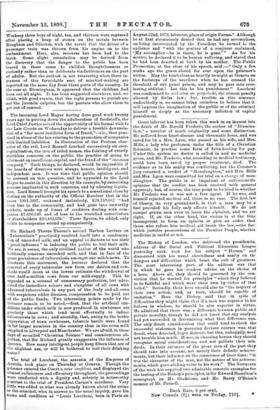The Bishop of London, who delivered the presidentia. address of
the Social and Political Education League yesterday week, took for his subject " Heroes," and discoursed with his usual shrewdness and sanity on the dangers and difficulties which beset the cult of greatness The most interesting part of his address was that in which he gave his readers advice on the choice of a hero. Above all, they should be governed by the con. viction that he worked for principles "which they believed to be faithful and which were their own by virtue of that belief." Secondly, their hero should also be "the inspirer of their own action, and, as such, should be capable of imitation." Here the Bishop said that in spite of difficulties they might claim that if a man was superior to his fellows in wisdom, he should be also superior in virtue. He admitted that there was a difference between public and private morality, though he did not know that any analysis had yet succeeded in determining what that difference was. The only direct consideration that could tend to check the successful statesman in pursuing devious courses was that deceit, when detected, begot distrust, but this, unhappily, need not trouble him much. Hence, in choosing heroes they should recognise moral considerations, and not palliate their mis- deeds. In their estimate of the great men of the past they should take into account, not merely their definite achieve- ments, but their influence on the conscience of their time: "it was the character of the man, not the nature of his achieve- ments, which gave abiding value to his work." The literature of the week has supplied two admirable concrete examples for the testing of the Bishop's principles, in Sir Edward Hamilton's monograph on Mr. Gladstone, and Mr. Barry O'Brien's memoir of Mr. Parnell.






































 Previous page
Previous page